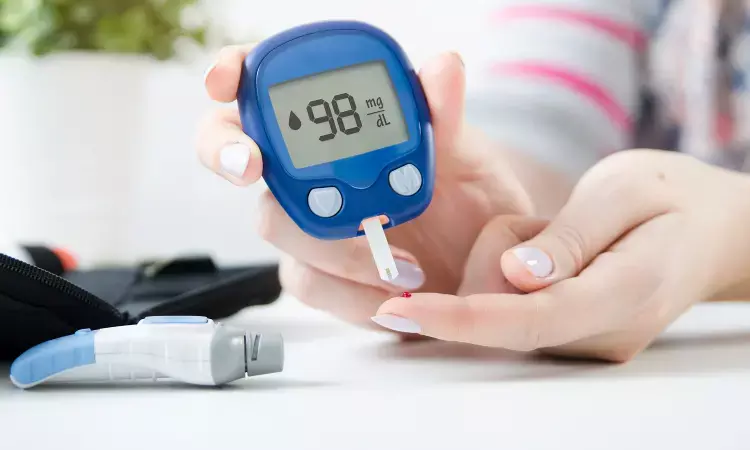- Home
- Medical news & Guidelines
- Anesthesiology
- Cardiology and CTVS
- Critical Care
- Dentistry
- Dermatology
- Diabetes and Endocrinology
- ENT
- Gastroenterology
- Medicine
- Nephrology
- Neurology
- Obstretics-Gynaecology
- Oncology
- Ophthalmology
- Orthopaedics
- Pediatrics-Neonatology
- Psychiatry
- Pulmonology
- Radiology
- Surgery
- Urology
- Laboratory Medicine
- Diet
- Nursing
- Paramedical
- Physiotherapy
- Health news
- Fact Check
- Bone Health Fact Check
- Brain Health Fact Check
- Cancer Related Fact Check
- Child Care Fact Check
- Dental and oral health fact check
- Diabetes and metabolic health fact check
- Diet and Nutrition Fact Check
- Eye and ENT Care Fact Check
- Fitness fact check
- Gut health fact check
- Heart health fact check
- Kidney health fact check
- Medical education fact check
- Men's health fact check
- Respiratory fact check
- Skin and hair care fact check
- Vaccine and Immunization fact check
- Women's health fact check
- AYUSH
- State News
- Andaman and Nicobar Islands
- Andhra Pradesh
- Arunachal Pradesh
- Assam
- Bihar
- Chandigarh
- Chattisgarh
- Dadra and Nagar Haveli
- Daman and Diu
- Delhi
- Goa
- Gujarat
- Haryana
- Himachal Pradesh
- Jammu & Kashmir
- Jharkhand
- Karnataka
- Kerala
- Ladakh
- Lakshadweep
- Madhya Pradesh
- Maharashtra
- Manipur
- Meghalaya
- Mizoram
- Nagaland
- Odisha
- Puducherry
- Punjab
- Rajasthan
- Sikkim
- Tamil Nadu
- Telangana
- Tripura
- Uttar Pradesh
- Uttrakhand
- West Bengal
- Medical Education
- Industry
Dulaglutide improves blood sugar control in young people with type 2 diabetes: Study

USA: Treatment with dulaglutide effectively enhances blood sugar control in youth with type 2 diabetes who were being treated with or without metformin or basal insulin, according to findings from the AWARD-PEDS trial.
The study found that treatment with dulaglutide at a once-weekly dose of 0.75 mg or 1.5 mg is superior to placebo for improving glycemic control through 26 weeks without an effect on BMI. The study findings were presented at the American Diabetes Association (ADA) and subsequently published in The New England Journal of Medicine.
There is an increasing incidence of type 2 diabetes among youths. In some studies, once-weekly treatment with dulaglutide, a glucagon-like peptide-1 receptor agonist, was shown to be effective with regard to glycemic control in youth with type 2 diabetes.
Against the above background, Silva A. Arslanian and the team conducted a double-blind, placebo-controlled, 26-week trial. The study included participants aged 10 to <18 years; body-mass index [BMI], >85th percentile who were being treated with lifestyle modifications alone or with metformin, with or without basal insulin.
154 participants were randomly assigned in a ratio of 1:1 to receive once-weekly subcutaneous injections of placebo, dulaglutide at a dose of 0.75 mg, or dulaglutide at a dose of 1.5 mg. Participants were then included in a 26-week open-label extension study in which those who had received a placebo began receiving dulaglutide at a weekly dose of 0.75 mg.
The change from baseline in the glycated hemoglobin level at 26 weeks was the primary endpoint. Secondary endpoints included a glycated hemoglobin level of less than 7.0% and changes from baseline in the fasting glucose concentration and BMI. A safety assessment was also done.
Salient findings include:
- At 26 weeks, the mean glycated hemoglobin level had increased in the placebo group (0.6 percentage points) and had decreased in the dulaglutide groups (–0.6 percentage points in the 0.75-mg group and −0.9 percentage points in the 1.5-mg group for both comparisons vs. placebo).
- At 26 weeks, a higher percentage of participants in the pooled dulaglutide groups than in the placebo group had a glycated hemoglobin level of less than 7.0% (51% vs. 14%).
- The fasting glucose concentration increased in the placebo group (17.1 mg per deciliter) and decreased in the pooled dulaglutide groups (−18.9 mg per deciliter), and there were no between-group differences in the change in BMI.
- The incidence of gastrointestinal adverse events was higher with dulaglutide therapy than with placebo.
- The safety profile of dulaglutide was consistent with that reported in adults.
"Dulaglutide treatment at a once-weekly dose of 0.75 mg or 1.5 mg was superior to placebo in improving glycemic control through 26 weeks among youths with type 2 diabetes who were being treated with or without metformin or basal insulin, without an effect on BMI," wrote the authors.
Dr Kamal Kant Kohli-MBBS, DTCD- a chest specialist with more than 30 years of practice and a flair for writing clinical articles, Dr Kamal Kant Kohli joined Medical Dialogues as a Chief Editor of Medical News. Besides writing articles, as an editor, he proofreads and verifies all the medical content published on Medical Dialogues including those coming from journals, studies,medical conferences,guidelines etc. Email: drkohli@medicaldialogues.in. Contact no. 011-43720751


